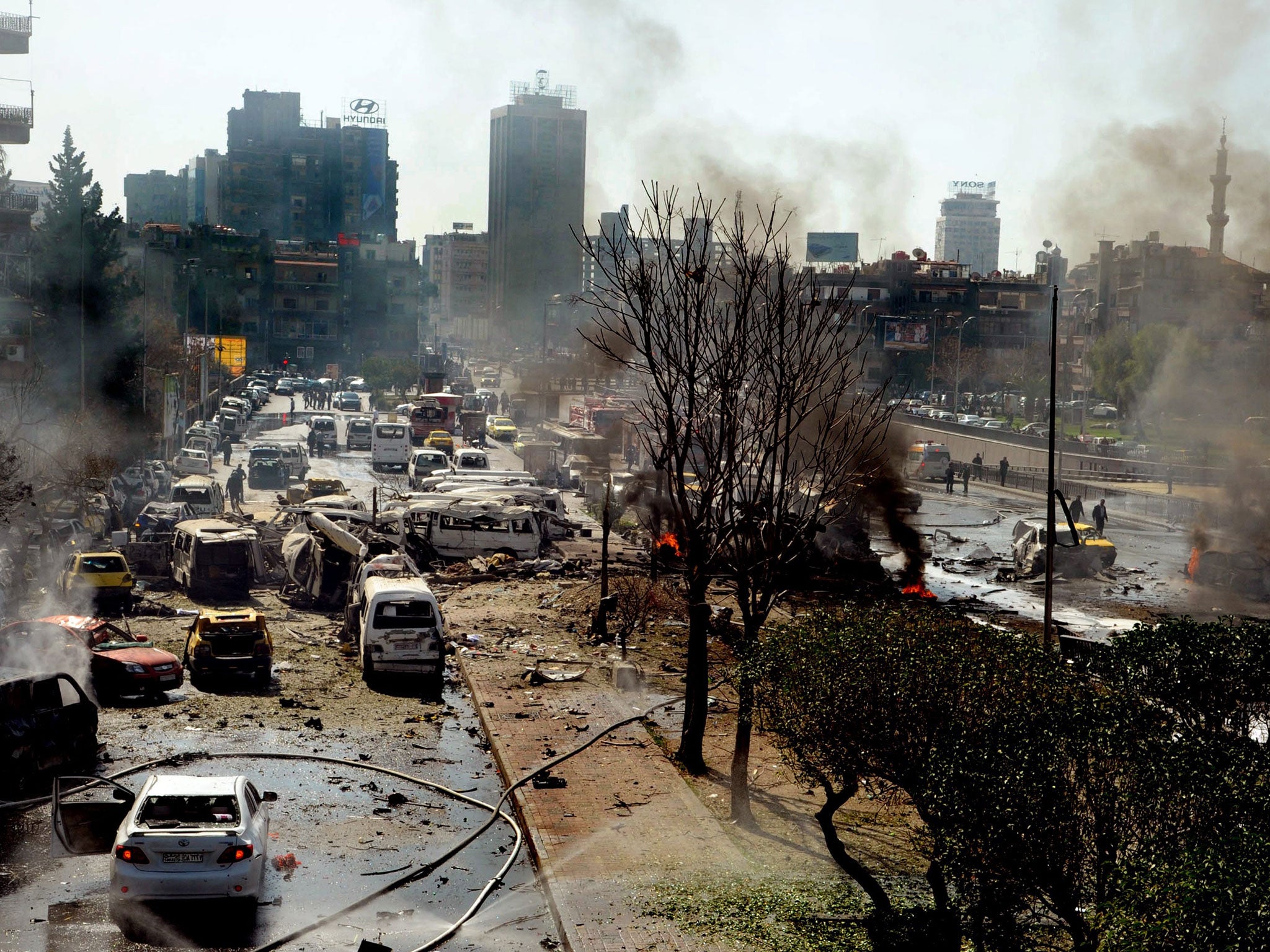Peace in Syria looks a vain hope as 53 die in car bomb
Children among the casualties after 1.5 tonnes of explosives are detonated in Damascus

A huge plume of black smoke hung over central Damascus today after a devastating car bomb killed at least 53 people, adding urgency to renewed efforts to reach a political solution to the civil war.
The explosion at a busy traffic intersection in Mazra’a district near the Baath Party headquarters and the Russian embassy blew out windows and ripped off building frontages. It was the latest salvo in what appears to be a renewed bombing campaign against regime targets.
Until recently central Damascus has been relatively insulated from the chaotic violence plaguing the rest of the country. Even as the sounds of fighting grew nearer, residents referred to the centre of the capital as the “Green Zone”, but the blast shook the city to its core.
Footage from the scene showed the burned out wreckage of dozens of vehicles and charred bodies lying in the streets as paramedics raced to treat the injured.
The vehicle was packed with as much as 1.5 tonnes of explosives, according to a Syrian official.
The dead included children from a nearby school and were mostly civilians. More than 200 were injured in the explosion that ripped a 1.5 metre crater in the road, according to state television, which said 53 had died. It blamed “terrorists” for the attack. The Syrian Observatory for Human Rights put the death toll at 59.
A local shopkeeper said a young girl walking past was killed by flying glass. “I pulled her inside the shop but she was almost gone. We couldn’t save her. She was hit in the stomach and head.”
The first blast, which occurred near a minibus station, was followed by a second at a heavily populated pedestrian bridge, according to the opposition National Coalition, which described the attacks as “heinous”.
“I heard several massive explosions saw a huge mushroom cloud,” said one resident of Kafr Sousseh.
He added that Damascenes were shaken and scared to leave their homes, with streets deserted following the blast.
It was among the two deadliest bombings in the capital since the conflict began and comes just a day after two mortars struck near a football stadium in the capital, which killed one player.
Jabhat al-Nusra, a hardline Islamist rebel faction, has claimed responsibility of similar attacks in the past.
Violence raged elsewhere, with warplanes bombing the old city in the southern city of Deraa for the first time in the conflict, according to activists.
The increasingly intrenched fighting makes the prospect of a meaningful political solution appear ever more distant, although renewed efforts are under way as the death toll reaches 70,000.
Moaz al Khatib, the National Coalition leader, has taken a more pragmatic approach to dialogue than his predecessors.
The group said it was willing to negotiate a peace deal brokered by the US and Russia to end the country’s civil war but President Bashar al-Assad cannot be a party to any settlement.
However, the communiqué released at a opposition conference in Cairo, Egypt, did not include a direct demand for Assad’s removal – which represents a softening of their demands.
Mr Khatib has singled out Syrian vice-president Farouq al-Sharaa as a potential counterpart for talks, saying he is less tainted than many others in the regime.
However, state media has dismissed the offer of talks as “political manoeuvring”. A Damascus based political analyst said that the regime is unlikely to take a seat at the negotiating table, with Mr Khatib’s overtures taken as a sign of weakness that has divided the opposition.
“I believe there’s sadly no prospect of seeing this regime engage in any kind of compromise,” he said.
Join our commenting forum
Join thought-provoking conversations, follow other Independent readers and see their replies
Comments
Bookmark popover
Removed from bookmarks